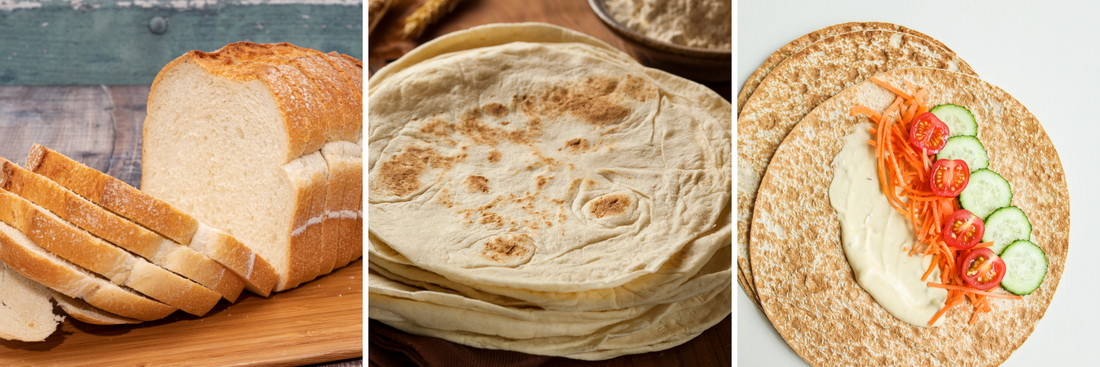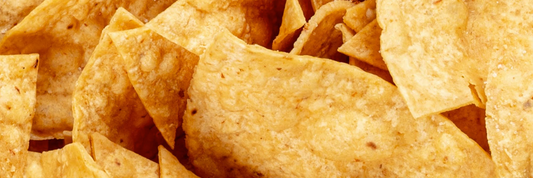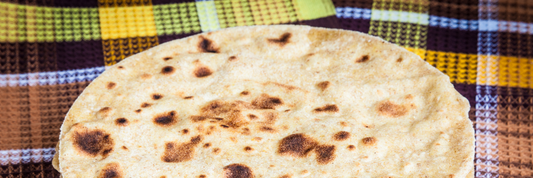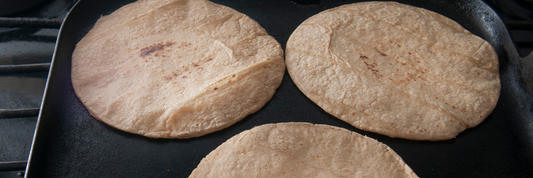If you’ve ever stood in front of the bread aisle wondering whether to grab a fluffy loaf, a stack of tortillas, or a pack of pita wraps, you’re not alone. Each one brings its own personality to the plate; bread is hearty and versatile, tortillas are soft and foldable, and pita wraps hide a perfect little pocket for your fillings. But when it comes to bread vs tortilla vs pita wrap, which should you choose? In this guide, we’ll explore the origins, textures, nutrition, and best uses of each so you can pick the perfect base for your next meal.
Bread vs Tortilla vs Pita Wrap: At-a-Glance Comparison Table
| Item | Typical Ingredients | Leavened? | Typical Calories per Serving | Typical Uses | Typical Shelf Life |
|---|---|---|---|---|---|
| Sliced Bread (white) | Wheat flour, yeast, water, salt | Yes (yeasted) | ~77 kcal per slice | Sandwiches, toast, pantry staple | ~5–7 days at room temp |
| Flatbread / Lavash | Wheat flour, water, oil, salt | Often unleavened | ~90–110 kcal per wrap (whole wheat) | Middle Eastern wraps, quesadillas, pizzas | ~5–7 days |
| Flour Tortilla | Wheat flour, water, fat, salt | Unleavened | 200–220 kcal for 10″ tortilla | Burritos, wraps, tacos | ~1 week refrigerated |
| Corn Tortilla | Nixtamalized corn masa, water, salt | Unleavened | ~50–60 kcal per 6″ tortilla (approx 218 kcal/100 g raw) | Tacos, enchiladas, chips | ~1 week refrigerated |
| Whole-Wheat Tortilla | Whole-wheat flour, water, fat, salt | Unleavened | ~110 kcal (whole-wheat wrap) | Healthier wraps, burritos | ~1 week refrigerated |
| Pita Pocket | Wheat flour, yeast, water, salt | Yes (yeasted) | ~90 kcal per pocket | Pocket sandwiches, pita pizzas | ~5–7 days room temp |
Nutrition Comparison – Bread vs Tortilla vs Pita Wrap
Calories and Serving-Size Issues
Wraps can unintentionally contain more calories than two slices of bread. For instance, a typical 10-inch flour tortilla alone can contain 200–220 kcal, while two standard bread slices range from 70–280 kcal, depending on type (white, whole wheat, etc.)
Carbs, Protein, and Fat Differences by Type and Size
Using real examples:
-
A whole-wheat wrap: ~110 kcal, with 22 g carbs, 4 g protein
-
Two slices of whole-wheat bread: ~260 kcal, 46 g carbs, 10 g protein
- A pita: ~275 kcal; tortilla ~310 kcal per same-size serving; tortilla has slightly more fat (~9.8 g vs 1.2 g) but also higher fiber (9.8 g vs 2.2 g) and protein (~9.8 g vs 9.1 g)
Fiber, Whole-Grain and Glycemic Index Considerations
Whole-grain versions—like whole-wheat bread and pita—offer more fiber and lower glycemic impact compared to refined wraps. For example:
-
Whole wheat bread slice: ~2 g fiber
- Whole wheat wrap: ~5 g fiber. Fiber intake helps with fullness, blood sugar stabilization, and gut health
Sodium and Added Fats in Commercial Wraps and Flatbreads
Commercial wraps often include preservatives, oils, and added sodium. The whole-wheat wrap example has ~380 mg sodium, compared to ~360 mg in two slices of bread. Bread may also have added emulsifiers and preservatives for shelf life. Always compare nutrition labels when choosing.
Ingredients And Production Differences
Sliced bread
Sliced bread is made primarily from wheat flour and yeast, which creates a light, airy texture through fermentation. Many recipes include milk, eggs, butter, or oil for added flavor and softness. The dough is kneaded, proofed, shaped into loaves, and baked until golden. Commercial bread may also include sugar, salt, and conditioners to improve texture and shelf life.

Tortilla
Tortillas come in two main types. Corn tortillas use masa harina made from nixtamalized corn, giving them a slightly chewy texture and rich corn flavor. These are usually unleavened. Wheat tortillas, on the other hand, use wheat flour, water, and fat, producing a soft and pliable flatbread that cooks quickly on a griddle.

How Long Do Tortillas Last and How to Tell If They’re Bad
Corn Tortilla vs Flour Tortilla: Key Differences Every Cook Should Know
Pita
Pita is made with wheat flour and yeast, similar to bread dough. The unique pocket forms when it is baked at high heat, causing steam to puff the dough and separate the layers. This makes it perfect for stuffing with meats, vegetables, and spreads.

Industrial processing
Mass-produced breads, tortillas, and pitas often contain preservatives, emulsifiers, and enriched flours. These additives can extend shelf life, improve texture, and replace lost nutrients from refined flour. While convenient, they can also affect nutritional value compared to fresh, minimally processed versions.
Texture, Structure, and Fillings
Bread strength
Sliced bread has a structured crumb that holds shape well, making it ideal for sandwiches. It also toasts evenly, creating a crispy exterior while keeping the inside soft.
Tortilla flexibility
Tortillas bend without breaking, making them perfect for rolling burritos, folding tacos, or wrapping sandwiches. Size matters: burrito tortillas are larger and sturdier, while taco tortillas are smaller and easier to handle one-handed.
Pita pocket
The natural pocket in pita bread makes it excellent for holding moist fillings like hummus, grilled meats, or fresh salads without spilling. It also works well for portable, mess-free meals.
Choosing the right base
Bread is best for hearty, layered sandwiches. Tortillas shine in wraps and rolled dishes. Pita is the go-to for stuffed, pocket-style meals. Choosing depends on whether you need structure, flexibility, or a built-in compartment for fillings.
Culinary Uses
Bread dishes
Classic uses include sandwiches, toast, paninis, and open-faced bruschetta. Bread’s texture also makes it suitable for French toast, bread pudding, and croutons.
Tortilla dishes
Tortillas form the base of tacos, burritos, quesadillas, enchiladas, and fresh wraps. They can also be fried into chips or used as a pizza base.
Pita dishes
Popular in Middle Eastern and Mediterranean cuisines, pita pairs perfectly with gyros, falafel, and shawarma. It can also be cut into wedges and served with dips.
Creative swaps
You can use pita like a flatbread for pizzas or spreads. Tortillas work as sandwich wraps or breakfast roll-ups. Thick sandwich bread can replace pita for handheld fillings or be used as a sturdy wrap for panini-style melts.
FAQs About Bread vs Tortilla vs Pita wrap
Which is healthier bread or tortilla or pita?
It depends on serving size, ingredients and whole-grain content; some wraps are higher in calories than two slices of bread.
Is pita healthier than bread?
Nutritionally similar per equivalent servings; whole-grain versions provide more fiber.
Can I use pita instead of a wrap?
Yes, for pocket-style fillings and smaller portions; choose whole-grain pita for more fiber.
Conclusion
When it comes to bread vs tortilla vs pita wrap, there is no one-size-fits-all choice. Each has its own strengths—bread offers hearty structure for sandwiches, tortillas provide flexibility for wraps and tacos, and pita pockets create convenient vessels for fillings. Your decision may come down to taste preferences, calorie goals, or the type of dish you are making. By understanding their differences, you can choose the option that best complements your meal while fitting your dietary needs.







